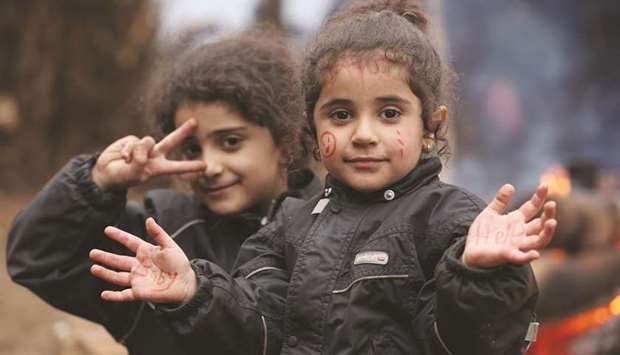The EU and Belarusian foreign policy chiefs spoke directly about the migrant crisis for the first time yesterday, even as Brussels prepares to impose sweeping new sanctions for human trafficking that Minsk said would be futile and “counter-productive”.
Josep Borrell said he had spoken to Foreign Minister Vladimir Makei by phone about “the precarious humanitarian situation” at the Belarus-Poland border — the EU’s eastern frontier.
“The current situation is unacceptable and must stop. People should not be used as weapons,” Borrell said in a tweet.
In Belarus’s statement about the conversation, Makei said any sanctions would be “hopeless” and “counter-productive”.
Thousands of migrants from the Middle East are camped out on the EU-Belarus border, creating a stand-off between the EU and US on one side and Belarus and its ally Russia on the other.
Western countries accuse Belarusian President Alexander Lukashenko’s regime of engineering the crisis by encouraging migrants to come to Belarus and then taking them to the border since the summer.
Belarus denies the charges and blames the West.
Russian President Vladimir Putin has also rejected accusations of being involved in the crisis and has urged the EU to speak directly to Belarus.
Poland earlier yesterday said dozens of migrants were detained after crossing from Belarus and warned of a possible larger breakthrough.
Local police said on Twitter that 50 migrants had crossed the heavily guarded border near the village of Starzyna “by force” on Saturday.
Aid agencies say at least 10 migrants have died on the border so far and have warned of a humanitarian crisis unfolding as temperatures drop below freezing, urging a de-escalation.
But Medycy na Granicy (Doctors on the Border), a Polish charity, said it was suspending its activities yesterday after five cars used by its team were smashed up by unknown assailants.
The charity’s work has been hampered before.
Last week, someone let out the air from their ambulance’s tyres while they were helping migrants.
On the Belarusian side, officials said there are 2,000 migrants including pregnant women and children in the biggest camp near the village of Bruzgi.
Belarusian authorities have delivered aid including tents and heaters — a move that could make the camp a semi-permanent presence on the EU border.
Poland has refused to allow the migrants in and has accused Belarus of preventing them from leaving.
Interior Minister Mariusz Kaminski on Saturday said a rumour was being spread among the migrants that today Poland would allow them through and coaches would come from Germany to pick them up.
The government has sent a text message to all foreign mobile phones along the border saying this was “a total lie and nonsense”.
“Those who spread such rumours seek to encourage the migrants to storm the border,” the message reads.
EU foreign ministers are also due to meet today to widen the sanctions already imposed on Belarus for its crackdown on opponents of Lukashenko, who has ruled the country for nearly 30 years.
Borrell said ministers would approve sanctions on anyone taking part in migrant trafficking, including airlines, travel agencies and officials.
“Lukashenko got it wrong. He thought that by acting in this way he would twist our arm and force us to cancel the sanctions. The opposite is happening,” he told the Journal du Dimanche, a French weekly.
Polish Prime Minister Mateusz Morawiecki said one of the measures being envisaged was the “complete closure of the border to cut off the regime from any economic benefits”.
Speaking to Poland’s PAP news agency, Morawiecki also said that the whole of the EU “should contribute jointly” to a Polish project to build a wall along the border.
One of the routes taken by the migrants has been through flights from Turkey and Syria.
Following pressure from EU diplomats, Turkey has now banned Iraqis, Syrians and Yemenis from flying to Belarus.
Private Syrian carrier Cham Wings Airlines has also said it is halting flights to Minsk.

Children look on in a migrants’ makeshift camp on the Belarusian-Polish border in the Grodno region, Belarus, yesterday. (Reuters)
